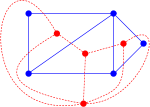|
|
An article published in May in Quanta Magazine had the following remark as its lead:
A surprising new proof is helping to connect the mathematics of infinity to the physical world.
My first thought was that the mathematics of infinity is already connected to the physical world. But Natalie Wolchover’s opening few paragraphs were inviting:
[…]

A recent discovery in the history of science and mathematics has prompted a number of articles, links to which are provided at the end of this text. Astrophysicist and science historian Mathieu Ossendrijver, of Humboldt University in Berlin, made the observation that ancient Babylonian astronomers calculated Jupiter’s position from the area under a time-velocity graph. […]
I’ve been reading Rebecca Goldstein’s Incompleteness: The Proof and Paradox of Kurt Gödel which, together with my finding David Mumford’s Why I am a Platonist, has kept me a bit more preoccupied, of late, with Platonism. This is not an entirely new preoccupation. I remember one of my early philosophy teacher’s periodically blurting out, “See, […]

I’m not sure what led me to David Mumford’s Why I am a Platonist, which appeared in a 2008 issue of the European Mathematical Society (EMS) Newsletter, but I’m happy I found it. David Mumford is currently Professor Emeritus at Brown and Harvard Universities. The EMS piece is a clear and straightforward exposition of […]
I did some following up on the work of Vladimir Voevodsky and for anyone who might ask, “what’s actually going on in mathematics,” Voevodsky’s work adds, perhaps, even more to the mystery. Not that I mind. The mystery emerges from the limitless depths (or heights) of thought that are revealed in mathematical ideas or objects. […]
An article in a recent issue of New Scientist highlights the potential partnership between computers and mathematicians. It begins with an account of the use of computers in a proof that would do little, it seems, to provide greater understanding, or greater insight into the content of the idea the proof explores. The computer program […]

The Amazing World of MC Escher is a new exhibit at the Scottish National Gallery of Modern Art in Edinburgh. It will be there from June 27 to September 27. The exhibit prompted a nice piece on Escher in The Guardian. Author Steven Poole mentions, but does not much explore, the relationship between Escher’s work […]
A short article in the April 16 issue of New Scientist reported on an applied soft computing paper that proposes an improvement on what’s known as ‘particle swarm optimization (PSO).
Particle swarm optimization (PSO) is an optimization technique inspired by the social behavior of birds. Described as a simple and powerful algorithm, it can be […]
Flipping through some New Scientist issues from this past year, I was reminded of an article in their July 19 issue that brought together a discussion of the brain and mathematics with particular emphasis on the effectiveness of employing the sometimes counter-intuitive notion of the infinity of the real numbers. The content of the article, […]
I’ve become fascinated with Gregory Chaitin’s exploration of randomness in computing and his impulse to bring these observations to bear on physical, mathematical, and biological theories. His work inevitably addresses epistemological questions – what it means to know, to comprehend – and leads him to move (as he says in a recent paper) in the […]
|
|





Recent Comments